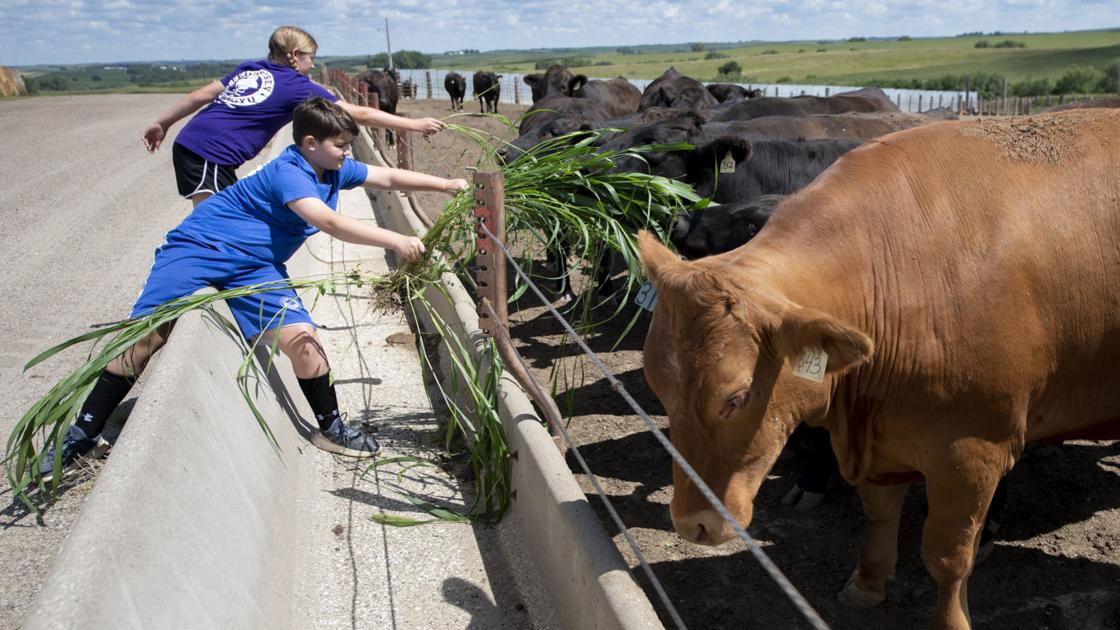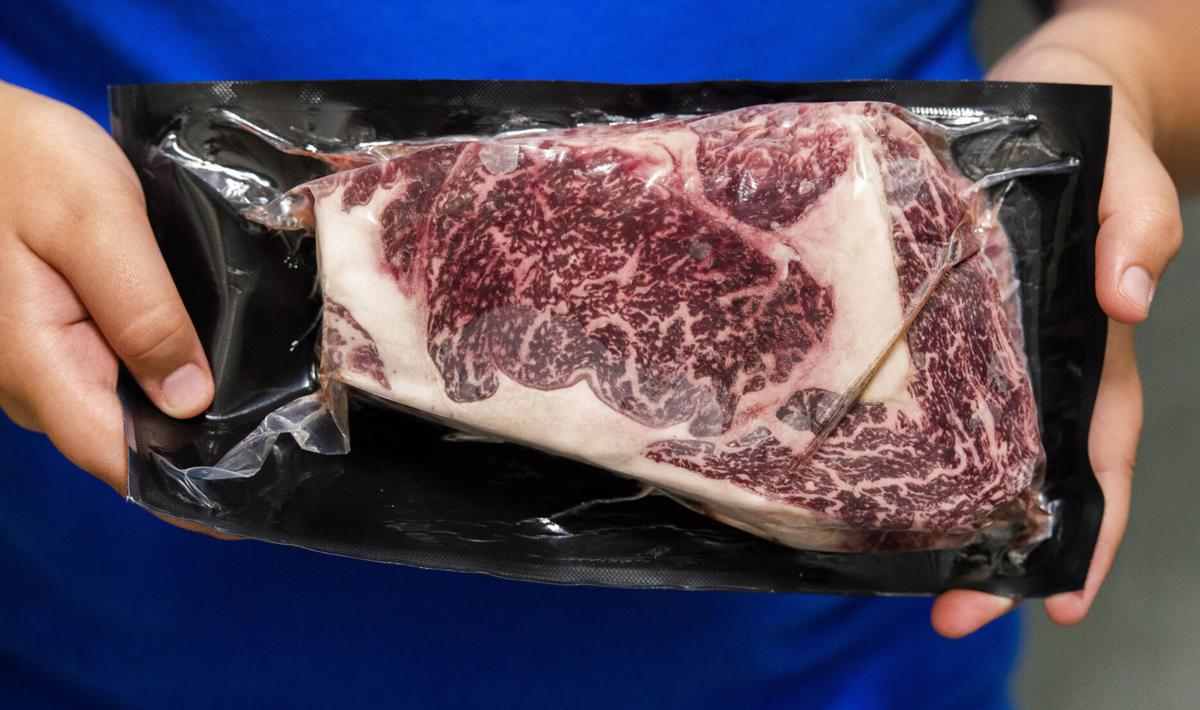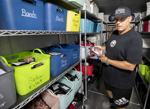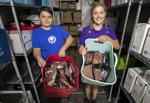

Dash Feddersen holds a frozen Wagyu ribeye steak Aug. 3 at Feddersen USA Wagyu in rural Anthon, Iowa.
ANTHON, Iowa -- Last spring was not a good time to be in the Wagyu beef business, so a family farm that raises the specialty cattle began selling their product independently, directly to consumers.
After the pandemic took root a year ago, high-end restaurants in New York City, Chicago and Los Angeles, which had served the high-grade beef to diners, shut their doors suddenly and weren't placing orders. So the Feddersen family had to get creative.
Father-and-son Larry and Brad Feddersen began "custom-feeding" (or, more simply put, caring for) Wagyu cattle back in 1996 for a Texas company that owned the animals. Brad married wife Shawna in 2006 and she joined the Feddersen crew, followed later by children Sophie and Dash.
About three years ago the family struck out on their own and purchased a herd of full-blooded Wagyus, raising them at their farms in rural Anthon, Iowa (Brad and Shawna's farm is less than a mile east of Larry and Marge's, and their operations are largely integrated). They sold the meat wholesale to restaurants through a broker.
Wagyu beef is one of the most prized meats in all the world -- the famous, and famously expensive, Kobe beef comes from Wagyu cattle raised in Japan. The black-brown or reddish-haired breed originates in Japan; the word Wagyu is a Japanese word, which loosely translates as "Japanese cattle."
The meat has extremely fine marbling, a marker of high quality, and a rich taste. Japan considers the breed a sort of national treasure, and exporting live Wagyu from the country is banned; some Wagyu had already made it to the U.S. before the export ban.
Beef from full-blooded Wagyu is generally graded at "high prime," a grade higher than the USDA's prime designation, which denotes an uncommonly high degree of marbling and other grading factors.
"The grading system for Wagyu is different, because they grade so much higher, they're actually off the scale of the USDA grading that takes you up to prime," Shawna Feddersen said.
In better days, before COVID-19, Wagyu was a good business, if somewhat complicated. Wagyu cattle take longer to reach market weight than ordinary cattle because they eat less feed on a daily basis -- usually the animals are fed for two years or so before they reach the market, longer than other cattle.
Feddersen family members all share in the work of tending the animals, and daughter Sophie has taken to giving the cows flower names like Lilly, Jasmine, Violet, Rose and Mary (short for marigold). The Feddersens take great pride in the quality of the product, and the full-blooded nature of their animals.
The cattle themselves are uneasy around people -- they will often run away en masse if a person enters their pen without a horse. The Wagyu are apparently more comfortable with horses than people.

Brad Feddersen holds a Wagyu ribeye steak Aug. 3 in a freezer at Feddersen USA Wagyu in rural Anthon, Iowa.
The market for Wagyu was turned upside-down by the coronavirus. The family had shipped out loads of Wagyu in January and February, but by March, with upscale restaurants shut down, the cattle had nowhere to go.
"We were like, 'Uh-oh, what are we going to do?'" Shawna Feddersen said.
"We didn't know what to do," Brad Feddersen said.
Since they already were independent owners and breeders of the Wagyu, the Feddersens decided to do their own marketing as well, selling Wagyu online and shipping it directly to customers.
They established a relationship with the J.F. O'Neill Packing Co., an Omaha meatpacker. The family had to learn about the dizzying variety of beef cuts.

Wagyu beef cattle are shown Aug. 3 at Feddersen USA Wagyu in rural Anthon, Iowa. A three-generation family farm operation, Feddersen raises purebred Wagyu cattle and sells the high-end beef online.
"We'd never done any of that. We just dealt with live cattle; we never dealt with the processing side. Somebody bought them, and they left, and we never knew anything else that happened after that," Shawna Feddersen said.
"It is so complicated, there's a major learning curve on a lot of the stuff," she added.
Then they needed a great, big freezer; usually these are not cheap. Brad Feddersen put out a call to a friend, and rather serendipitously, a disused industrial freezer turned up in Sioux City, at the abandoned Pizza Hut on Floyd Boulevard. The freezer worked and the price was right.
"I went and looked at it, and I bought it," Brad Feddersen said.
Shawna Feddersen has a background in marketing, though she'd never made a website. But she figured it out. The website, ilovewagyu.com, went live in the middle of June.
"Shawna did everything herself," Brad said.

Shawna, left, and Brad Fedderson show how they ship online Wagyu beef orders Aug. 3 at Feddersen USA Wagyu in rural Anthon, Iowa. At rear is daughter Sophie.
The beef is shipped on dry ice to customers in special insulated packaging. Shawna already had experience in shipping, and did experiments to see how long the dry ice would keep the beef frozen. Online sales have come in from as far away as California, Colorado, Texas and Florida and as near as Sioux Falls and Sioux City.
In due course, restaurants will probably reopen at full capacity and resume their wholesale Wagyu beef orders. But the Feddersens have had a taste of selling their product independently, straight to the customer, and they like it.
"It kind of eliminated the middle man," Shawna said. "But, on the flip side of that, it was a lot easier to just sell all the animals and get a check and we were done."
The Feddersens haven't completely abandoned the restaurant side of the business. Woodbury's: An American Steakhouse -- an eatery on the second floor of the Warrior Hotel serving "upscale rustic American cuisine" and billing itself as "the place to be and be seen" -- had the Feddersens' Wagyu on the menu when it opened.
That relationship came about because of Jerry Peterson, a Chesterman Co. sales manager and the proprietor of King Kong Fireworks in Sioux City. Peterson is a longtime friend of Brad's and a Feddersen customer. He was recently given a tour of the ongoing Warrior renovations and recommended the Feddersens' Wagyu to management.

Dash and Sophie Feddersen hold bins of frozen steaks Aug. 3 at Feddersen USA Wagyu in rural Anthon, Iowa.
"He's the one who lined us up with that," Brad Feddersen said. "It seems like everything now is meant to be."
Kobe beef is closer to a household name than Wagyu, though largely it's the same product. The name "Kobe" applies strictly to an expensive type of Wagyu beef grown in Japan -- similar to how champagne, in the strictest sense, refers only to that product which comes from the Champagne region of France and not to other sparkling white wines.
The Feddersens are hoping to raise the profile of Wagyu, to where the product might be as recognizable as Kobe. It's a special-occasion sort of meat due to the price, and their hope is that people will come to think of Wagyu as a go-to meal for birthdays or anniversaries.
"People that try it really like it. So the challenge is getting people to try it. Because it is more expensive," Shawna Feddersen said.
March 22, 2021 at 08:15AM
https://ift.tt/3saI87y
PROGRESS: Wagyu cattle farmers in Anthon, Iowa, become independent beef retailers - Sioux City Journal
https://ift.tt/2RxTDX4
Beef

No comments:
Post a Comment